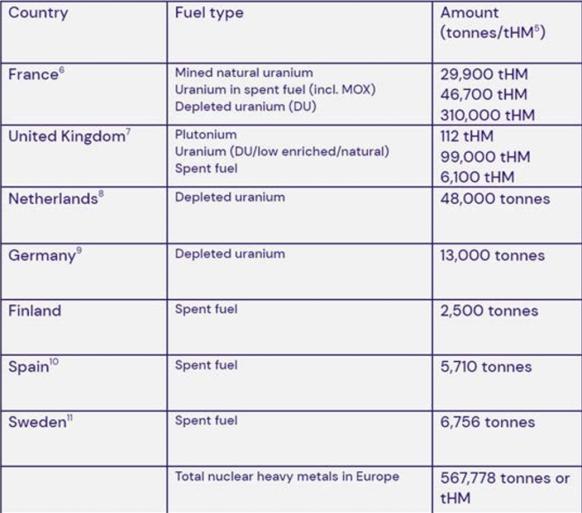Recycling over repositories, say pro-nuclear environmentalists
Nuclear waste should be recycled while plans to store spent nuclear fuel in geological repositories should be scaled back as they feed a distorted narrative and may be unnecessary, according to a report by environmentalists RePlanet.

Related Articles
The concern that radiation from spent nuclear fuel (SNF) can not be sufficiently contained is one of traditional environmentalists' key objections to the technology, with images of toxic, green sludge common in popular culture.
However, the search for a science-based approach to reaching net zero has many modern ‘greens’ reconsidering nuclear power technology as part of a future, emission-free, electricity generation mix.
The energy crisis that emerged following Russia’s invasion of Ukraine has helped bring nuclear power into sharp focus.
“I suspect that the Ukraine situation has given us a big push, one that the climate emergency never quite did because those who are most concerned about climate were mostly anti-nuclear,” says Mark Lynas, a climate writer and co-founder of the pro-science environmental campaign network RePlanet.
“RePlanet has come into existence specifically as a home for environmentalists who had no home amid the anti-nuclear agenda of the environmental movement, a pro-science version of Greenpeace.”
RePlanet is made up of an alliance of, at today’s count, a dozen pro-nuclear national environmental organizations that are driven by science-based solutions to climate change, biodiversity collapse, and the need to eliminate poverty, according to its website.
Limitless energy
Its latest study, ‘What a Waste: How fast-fission power can provide clean energy from nuclear waste’, argues that there is sufficient energy in waste to run Europe at current electrical power consumption for up to a thousand years.
“If unconventional uranium and thorium resources are considered in the global picture, nuclear fuel is essentially limitless: sufficient to supply a growing human civilization with carbon-free energy for tens of thousands of years, and likely far longer,” according to the report which Lynas lead-authored.
Recycled SNF for use in the new generation of fast-neutron reactors, leaves fission products that would return to a level of radioactivity comparable to the original uranium ore within 200-300 years, meaning plans for geological disposal strategies can be simplified and scaled back, the report says.
“RePlanet is therefore proposing a repurposing of nuclear materials with a view to fast-tracking an urgent program of fast reactor build outs. These must be deployed in such a way as to reduce grid congestion and increase security of supply to enable the deployment of wind, solar and nuclear for the majority of electrical power generation and heat supply in a net zero Europe,” the report states.
According to RePlanet’s calculations, Europe has an inventory of almost 580,000 tons of potential nuclear fuel for fast reactors, compared to around 470,000 tons of uranium in depleted uranium (mostly stored as 700,000 metric tons of uranium hexafluoride, or UF6) in the United States, and a worldwide stock of about 1.6 million tons of depleted uranium only, not including spent fuel.
The report admits that the efficiency of new fast reactors is still to be properly proven but notes that by recognizing that the specific fission energy yield of all nuclear fuels is around 22,000 GWh per ton, the 580,000-ton stock of heavy metals in Europe could yield over 12 billion GWh of heat energy.
If this heat energy is converted to electricity with a 33% efficiency, the European stock could, potentially, yield some 4 billion GWh compared to the almost 3 million GWh of electricity currently used annually in the region.
Assuming a partially effective recycling, such stock could last over 600 years, it concludes.
Approximate stockpiles of nuclear materials held in Europe
(Click to enlarge)
Source: RePlanet's 'What a Waste: How fast-fission power can provide clean energy from nuclear waste'. For national breakdowns: https://www.replanet.ngo/whatawaste.
Psychological block
The nuclear industry’s current approach to SNF is psychological, rather than technical, and makes the waste seem more dangerous than it is, Lynas says.
“You can see in some of the polling work we've done that even people who say they're pro nuclear also say they're very concerned about nuclear waste. And people who oppose nuclear put nuclear waste as the top reason why, and they are not amenable to change. So, it's become a moral issue,” he says.
Nuclear waste is no more toxic than much waste from other heavy industries, but the moral and political millstone that hangs around the neck of the nuclear sector has prompted scientists to promote the ‘bury-it-in-the-ground’ approach through geological repositories, something which Lynas calls “the worst idea the nuclear power industry ever had.”
By framing the waste as something so toxic it needed to be buried deep in the bedrock for millions of years, the industry has dealt a severe blow to its own image, he warns.
“If you reframe it as a resource and talk about recycling it … then I think you've essentially defused the time bomb of toxic nuclear waste as part of the debate,” he says.
“Anti-nuclear 'greens' have clung on to the nuclear waste issue because it's been a gift that keeps on giving for them and the industry has to stop giving them that gift.”
By Paul Day

